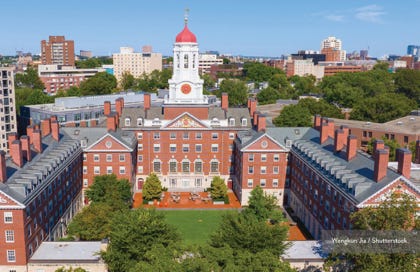Trump vs. Harvard: Intellectual Freedom in the Crosshairs
Both Trump’s pressure and the status quo of federal funding infringe on intellectual freedom.
The Trump administration’s sudden cuts to federal research grants to Harvard, Columbia and other universities have rightly raised alarm. But restoring the pre-Trump status quo, as Harvard and many academics demand, will not safeguard intellectual freedom.
Why not? Because the administration’s actions are only a vile escalation of the infringement on intellectual freedom inherent in any system of federal funding. Both are destructive and both must go.
Start with the Trump administration. Under the pretext of combatting the real problem of antisemitism on campus—this from a president who dines with anti-Semites—the administration is demanding intellectual control over Harvard’s faculty and student body. Harvard must submit to an audit of “its student body, faculty, staff, and leadership for viewpoint diversity.” Specific departments including the Divinity and Medical schools will get special scrutiny to see if they “reflect ideological capture.” Diversity, equity and inclusion (DEI) programs must end. Harvard must not admit any international student whom the government considers “hostile to the American values and institutions inscribed in the U.S. Constitution and Declaration of Independence.” (Presumably foreign supporters of January 6th—that day of love—are exempt.)
Harvard is right to balk. It is right to declare that no government “should dictate what private universities can teach, whom they can admit and hire, and which areas of study and inquiry they can pursue.”
A private university like Harvard could choose to ignore the administration’s demands. But that means forfeiting federal research funding, which puts it at an unfair disadvantage when competing for students, faculty and donors with universities that continue to receive massive federal payouts.
If Harvard and other private universities truly seek freedom, therefore, they should demand that federal research funding be altogether phased out.
Harvard should argue that since any federal funding must have some government strings attached, it infringes on intellectual freedom. Instead, it welcomes more government funding and objects only to the specific nature of the strings or to the way they are currently being pulled.
For instance, Harvard does not challenge the government demanding that it do more to combat antisemitism, it simply laments that the present administration seems unwilling “to work with us to address antisemitism in a cooperative and constructive manner.” Harvard does not object when administrations impose ideological goals it agrees with, such as the many DEI initiatives like the requirement that grant applicants submit “diversity plans”; it only objects when it disagrees with the government’s ideological goals.
But universities cannot get around the fact that federal grants by their nature selectively fund certain ideas at the expense of others. The government picks intellectual winners and losers among private citizens, which is the opposite of intellectual freedom.
How was Harvard awarded the billions of dollars that the Trump administration is now threatening to withdraw? Federal employees at agencies such as the National Science Foundation, National Institutes of Health and the National Endowment of the Humanities look through tens of thousands of grant applications every year and decide which private researchers will receive federal grants and which will not.
Even in the best-case scenario, when federal bureaucrats try to proceed conscientiously, such a system creates increased conformity within an academic field. The bureaucrats will tend to defer to recognized experts in the field, which means established theories and methodologies are much more likely to receive federal support, making it difficult for intellectual minorities and innovators to compete. This plays out across the entire university, which is strongly incentivized to hire researchers likely to receive federal grants.
In worse scenarios, bureaucrats actively pursue an ideological agenda, deliberately rewarding some viewpoints and penalizing others. This is a major cause of how DEI swept through the universities. And this is now what the Trump administration is nakedly claiming the power to do. Tellingly, in its latest harangue the administration says it is punishing Harvard for crudely political reasons, including that “Harvard hired failed Mayors Bill De Blasio and Lori Lightfoot, perhaps the worst mayors ever to preside over major cities in our country’s history.”
Intellectual freedom is the principle that all individuals have the right to think for themselves, to express their convictions on any subject, and to give their support, financial or otherwise, only to the ideas they choose. When government coercively seizes your money and uses it to subsidize some research program or viewpoint for any reason, it is violating your intellectual freedom. This is the injustice inherent in all government research grants. It is this that private universities like Harvard should now name and challenge.
Instead, they fight for “academic freedom.” Academic freedom is the opposite of intellectual freedom. It asserts the right of universities and professors to teach, write and research whatever they see fit — at your, the taxpayer’s, expense. Trump’s measures only replace “academic freedom” with a worse, more authoritarian form of the same injustice: the license not of universities and professors but of the executive branch to dictate which ideas you will be forced to subsidize.
The threats to Harvard and Columbia should be a wake-up call for private universities and for all who care about intellectual freedom. The right path forward is neither to defend the Trump administration nor to demand a return to the pre-Trump status quo, but to phase out, gradually and impartially, all federal grants and subsidies. Make private universities fully private. Let each of us as individuals decide which universities we will frequent and fund.
A version of this article was first published in The Hill on May 29.
Sam Weaver
Sam Weaver, BA in English, is an associate fellow at the Ayn Rand Institute and a recipient of the Conceptual Education Fellowship.
Onkar Ghate
Onkar Ghate, PhD in philosophy, is a senior fellow and chief philosophy officer at the Ayn Rand Institute. A contributing author to many books on Rand’s ideas and philosophy, he is a senior editor of New Ideal and a member of the ARU faculty.







Building a private university dependent on government funding is inviting government regulation. Trump, the guy who recognized Jerusalem as the capitol—whose own daughter, son-in-law, and grandchild are Jewish—and who is standing by Israel right now as Iran attacks, is not under suspicion of being antisemitic just because he has dinner with politicians from practically every country and political faction on Earth. That’s what he’s supposed to do.
As tempting as some find it to try to point a finger at Trump for the appearance of political neutrality, it’s kind of a joke. The government is right to combat Harvard’s racist DEI policies and federal funding of private research should be massively reduced by the administration and DOGE. However, the government could be doing more overall to equalize opportunities during childhood, so that policies of hiring or giving preference based on group membership (such as race) are not necessary.
Great article Sam!